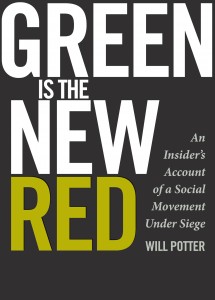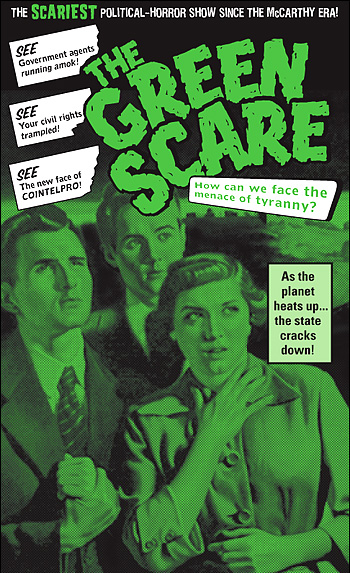Here are some selections from Will Potter’s book, Green is the New Red, that chart the genealogy of eco-terrorist rhetoric. Regardless of where you stand with regard to environmentalism or monkey-wrenching, it’s nevertheless important to understand how the term terror is being specifically deployed in an age increasingly defined by such a label.
The mainstreaming of animal and environmental concerns, combined with tiers of lawful and unlawful groups, was undeniably a threat to the corporations [they] targeted. [Corporations] needed to displace activists from their moral high ground. A key development in orchestrating this fall from grace was the decision to wield the power of language.

“Whoever defines the issue controls the debate,” says Timothy Cummings, a clinical professor and poultry veterinarian at Mississippi State University. Instead of saying “bled to death,” Cummings advises farmers to say “exsanguinated”; rather than “killer,” say “knife operator.” For those who break the law in the name of animal rights or the environment, industry groups would change the language from “monkey wrencher,” “saboteur,” or just plain “criminal” to the much more powerful “terrorist.”
Indeed, it’s a far more powerful phrase, but the difference is that now such a label has salient consequences for law enforcement, governmental policy, and judicial proceedings. So when I read, say, Rick Santorum’s recent sweeping claims about environmentalism, I get anxious on a whole lot of levels. At a campaign stop in Oklahoma City, Santorum argued that environmentalists are using fracking as “the new boogey man” to needlessly scare you about a perfectly safe practice. But what’s really happening here, Santorum claims, is that “they will use this [fear] to raise money for the radical environmental groups so they can go out and continue to try to purvey their reign of environmental terror on the United States of America.”

(The irony of Santorum scaring potential voters and donors with phrases like “reign of environmental terror” and denouncing those seeking to implement a radical agenda is so rich I’m going to use it to ice this cake I just made.)
Here’s some history on the use of “eco-terrorism” from Potter:
Government official slowly incorporated the term into their lexicon and change how they spoke of sabotage [toward the end of the ’80s]. After a 1987 arson at the University of California at Davis, the FBI labeled an animal rights crime “domestic terrorism” for the first time. The next year, Senator James McClure introduced the term eco-terrorist into the Congressional record (oddly enough, by comparing the tactics of drug lords to those of environmentalists).
Despite these linguistic victories, eco-terrorism was not a top governmental priority. Ron Arnold’s organization [the Center for the Defense of Free Enterprise] and the anti-environmental “Wise Use” movement operated on the fringes; the eco-terror meme remained loosely confined to this niche of free-market true believers, and sympathetic media portrayals continued through the late eighties […] This began to change when politicians got involved in the issue.
Use of the “eco-terrorist” label picks up substantially throughout the nineties, especially following the well-reported arson of a Vail ski resort in 1998. It was 9/11, however, as the phrase goes, that changed everything. Greg Walden, a Republican Representative from Oregon said on September 12 that the Earth Liberation Front was a threat “no less heinous than what we saw occur yesterday here in Washington and New York.” Before the steel of the towers had even stopped smoldering, “Industry groups hired PR firms to insert eco-terrorism into the national security dialogue,” writes Potter. Since 9/11, “the eco-terror language went viral, replicating by spreading from host to host.”
But this is not a conspiracy, Potter is right to point out. It’s framing. It’s the introduction of and normalizing of key terms that shape attitudes and perspectives. “The shift was gradual,” he writes, “slowly merging the rhetoric of industry groups with that of politicians and law enforcement. Eventually, what was once a fringe argument became official government policy.”
If that isn’t enough to boggle the rational mind and quicken the passionate heart, there’s this:
Examining top-tier newspaper articles from 1984 through 2006, [Travis Wagner, professor of environmental science and policy at the University of Southern Maine] found that terrorism rhetoric appeared throughout the timeline, but its frequency increased dramatically after September 11th and has continued climbing since then. Wagner notes that this increase in ecotage-related stories accompanied a decline in actual crimes. According to the North American [Animal Liberation Front] Press Office–not one to downplay ALF and ELF attacks–crimes decreased by 47 percent after 9/11. As warning of eco-terrorism made headlines, the threat itself waned.







